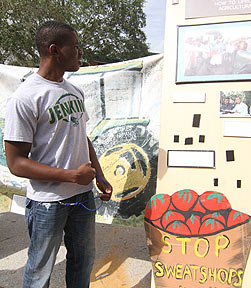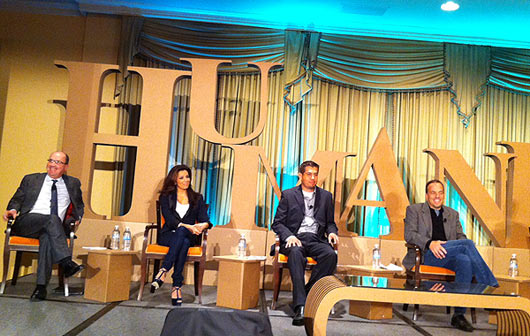
Students at Lakeland’s George Jenkins High (named after the founder of the Publix supermarket chain) experience the weight of a full tomato bucket during the visit of the Modern-Day Slavery Museum to the school last month.
Things can get a little hectic in the Campaign for Fair Food and, as a result, every now and then we look around and realize that we have allowed a number of great stories fall by the wayside while we try to keep up with all the day-to-day happenings. And so today, in order that those stories do not molder away forever under stacks of the very latest news at Campaign headquarters, we are debuting an update that will appear from time to time in these pages that we call “Left Behind”.
Modern-Day Slavery Museum
 Today’s edition begins with last month’s wildly successful visit by the CIW’s Modern-day Slavery Museum to George Jenkins High School in the heart of Lakeland, Florida. George Jenkins HS was named after the much-beloved founder of the Publix supermarket chain (the man who said famously, “Never let making a profit stand in the way of doing the right thing“), but, happily, that fact didn’t keep school officials from allowing students there to learn about the history of forced labor and farmworker exploitation in Florida and about the efforts under way to make farm labor abuse a thing of the past.
Today’s edition begins with last month’s wildly successful visit by the CIW’s Modern-day Slavery Museum to George Jenkins High School in the heart of Lakeland, Florida. George Jenkins HS was named after the much-beloved founder of the Publix supermarket chain (the man who said famously, “Never let making a profit stand in the way of doing the right thing“), but, happily, that fact didn’t keep school officials from allowing students there to learn about the history of forced labor and farmworker exploitation in Florida and about the efforts under way to make farm labor abuse a thing of the past.
Nearly a dozen teachers made room in their lesson plans for the day to let their students participate in the visit, and hundreds of kids, from football players to student class presidents, made their way through the museum throughout the day. One student told the museum crew of his own experience picking tomatoes in nearby Plant City, the miserably low pay he received (far below minimum wage by his telling), and how exhausted he was at the end of the day. Another student told of how he had heard about the campaign in his parish and attended a Publix protest in support.
Also last month, Gerardo Reyes and Greg Asbed of the CIW participated in a panel, sponsored by Southern Methodist University in Dallas and Oxford University to kick off the 2012 Engineering and Humanities Week, on the topic of “The 21st Century Supermarket“. But it was hardly your average academic panel:

Beyond Gerardo and Greg from the CIW (second and first from the right, respectively), the panel included the actress Eva Longoria and Jack L. Sinclair, the executive vice president, Food Division, of Wal-Mart. It was a high wattage event (literally and figuratively), with a provocative premise:
| “We inherently assume that all goods produced here are held to a higher labor standard. In farming, this is categorically false. The abuses that can exist at the lowest level of the food chain are shocking. There are enough cases of forced slavery, sexual abuse and wage theft to warrant serious concern. But what can a consumer do to make labor-conscious purchases when no such certification exists?
The panel will explore the responsibilities that supermarkets have to both their customers and their suppliers. They will also discuss the responsibilities consumers have to be good citizens. When it comes to the topic, as consumers we need to be aware of where our food comes from.” |
The discussion touched on the impact of the Information Age on the decisions of today’s consumers, and all agreed that while the supermarket of the last century merely sold food, this century’s shoppers are buying food plus the information behind the food — its nutritional value, its safety record, and, increasingly, the story of how the workers who produced the food were treated. All agreed that the inevitable collision between the modern technology informing consumers’ decisions and the antiquated labor conditions in this country’s farm fields will produce energy for progressive change in the agricultural industry, and that the companies that understand this new reality and get ahead of it first will thrive. It was a frank and wide-ranging discussion that held great promise for continued progress in Florida’s fields.
Media Round-up
And, finally, we reach the Media Round-up portion of our “Left Behind” series. Among the articles that fell through the cracks this month are two stories looking back at the Fast for Fair Food outside Publix headquarters in Lakeland, one from NPR looking at the recent premiere of the documentary “Payback”, which includes a long segment on the Campaign for Fair Food, and one from the world of corporate social responsibility, where a not-so-distant cousin of the CIW talks about the Campaign. Enjoy!:
- “Is not this the fast that I choose?,” Generate Magazine, 4/3/12
- “Florida UUs campaign for impoverished migrant workers,” uuworld.org, 4/23/12
- “Demanding ‘Payback’ That May Never Come,” NPR, 4/26/12
- “Growing the Good: An Interview With Oran B. Hesterman,” CSR Wire, 4/26/12
